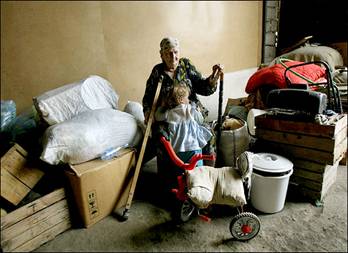|
|
Guerrilla Raids Force Chechen Refugees to Flee Again
By C. J. Chivers, The New York Times
June 28, 2004

Photo By Sergei Kivrin/Agence France-Presse, for The New York Times
AZRAN, Russia -A woman from Chechnya, an invalid, sat by a mound of dirty possessions, her three grandchildren wandering in the dust nearby. Their refugee camp was emptying, but they were too poor to buy a ride on the trucks hurriedly heading out of here.
"I have been packed and waiting for three days," said the woman, Manzha Yansuyeva, 78. "I am hoping someone will pity us and help us move."
Following raids by Islamic guerrillas the night of June 21 in the southern Russian republic of Ingushetia, Chechen refugees are in motion once more, saying they are being blamed for the guerrillas' success and must leave or face retaliation in the night. They are deeply afraid.
The guerrillas overran police stations and checkpoints here early last week, and, dressed in police uniforms themselves, systematically executed law enforcement and military personnel who tried to come to their besieged friends' aid. Nearly 100 people died before the guerrillas withdrew.
In the days since, Russian and Ingush police, wearing ski masks and carrying assault rifles, have accused Chechen refugees of assisting and sheltering the guerrillas. They have been rounding up Chechen men for questioning and, the refugees say, for beatings. In several camps housing refugees who fled the wars during the past decade between Chechen separatists and the Russian government, utilities have been cut off.
Thousands of Chechens are heeding what they regard as an implicit message, now fleeing Ingushetia for Grozny, Chechnya's capital. To stay, they say, is to risk their lives. "We haven't slept for days already," said Yakhita Dzhabrailova, 57.
Grozny hardly invites. Having suffered two wars in a decade, the city is in ruins, occupied by the Russian Army and controlled by grim-faced armed men whose affiliation - be it army, police, local militia or tribe - is rarely clear. Armored vehicles roam what passes for roads. Fighting continues in the mountains to its south. Ambushes, bombs and freshly planted mines occur sporadically almost everywhere else.
More frightening, civilians frequently disappear, seized in what human rights organizations and local residents describe as a mix of kidnappings for ransom and violence against residents accused of supporting, even knowing, the guerrillas.
It is a measure of the fear in Ingushetia that refugees are deciding that Grozny is their safest bet. The inherent dangers were evident on Saturday morning, when word circulated through one camp that two families had been killed in a rocket attack at a village on their way home.
Estimates of the number of Chechen refugees who remain in Ingushetia, a Muslim republic adjacent to Chechnya, range from 40,000 to 80,000. As many leave, some say their relocation is temporary, an effort to elude a period of retribution. Others say they are gone for good.
Dark irony lies in the departures.
A cornerstone of President Vladimir V. Putin's effort to convince the world that Chechnya has been stabilizing has rested on Chechen refugees. During the height of the second Chechen war, more than 100,000 Chechens sought refuge on Ingush soil; the Kremlin has hoped that coaxing them home would demonstrate security and hope.
But tens of thousands of refugees had not complied with Moscow's wish, choosing a suspended state of poverty and grief in Ingushetia over lingering horrors in Chechnya.
It took the outbreak of violence - an expansion of terror, not a reduction - to put them to motion. Even then the refugees took prodding.
At the Altiyevo dairy farm, a former Soviet collective where refugees built housing in cow stables, dozens of refugees said the authorities moved in on Wednesday, carrying rifles and shouting obscenities.
First, the refugees said, they gathered young men and took 36 away. Then the police threatened the women, telling the refugees they were complicit in the attack.
The next day, a Russian helicopter hovered over a nearby field, and the police came and searched the area, announcing they had found abandoned weapons and uniforms in the grass. This time, five or six elderly Chechens were beaten, and two were taken to a room, refugees said.
"They put pistols to their heads and made them sign blank pieces of paper," said Zukhra Khopizova, 25, who stood in a crowd of distraught women. The refugees said they fear the blank papers will be seen again, with confessions written in by an unknown hand.
Eight men have returned. Most took their families and quickly left.
At the Logovaz camp, the authorities also showed up in masks on Wednesday and forced the Chechen men to line up with shirts off, to see if any showed marks from firing a rifle in battle. The next day, two teenagers were snatched by masked men at a bus stop in front of the camp, the refugees said.
At the Kamaz camp, eight young men were taken, then released, refugees and rights workers said. At the Troyetskoye dairy farm, 22 men were briefly arrested.
A spokeswoman for the Ingushetia internal affairs ministry confirmed that the police were active in the camps and had taken suspects for questioning, but she said the refugees were still welcome. "It was what we call a pinpoint operation," she said. "You cannot call it a mass roundup. Our attitude toward the refugees has not changed."
She also said three Chechens had admitted to participating in the attacks.
With fearful refugees living alongside the police and Ingush families enraged by the guerrilla attacks, the tensions are crackling. At the central mosque of Nazran, the imam worried that violence would escalate.
"Our republic has always been known for its hospitality," said the imam, Khizar Tsovoyev. "Let Muslims all over the world pray for us, so we will have peace."
For now, there is no peace.
|

|
|



